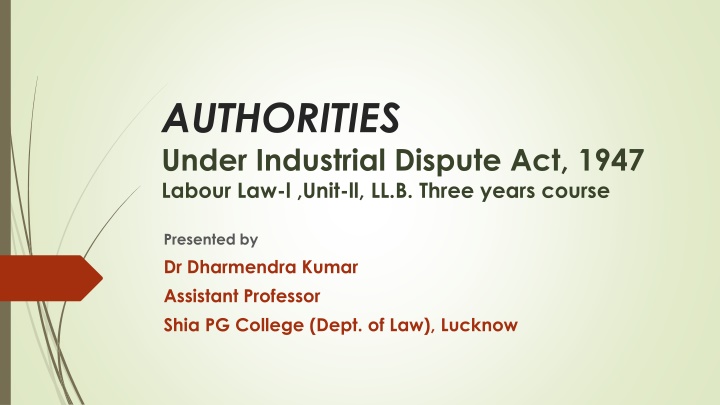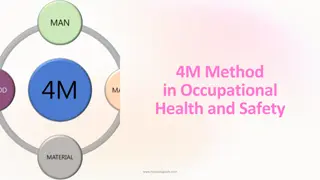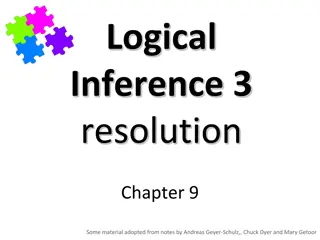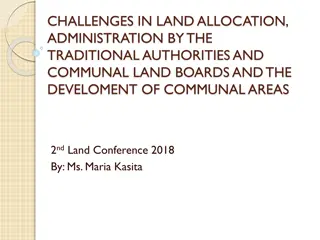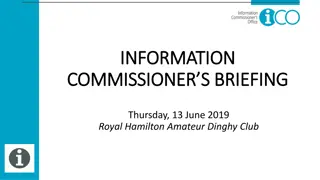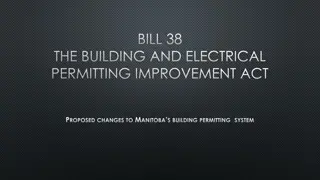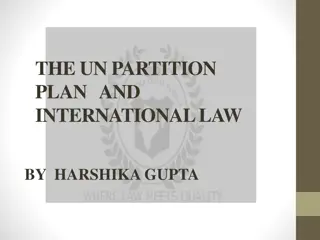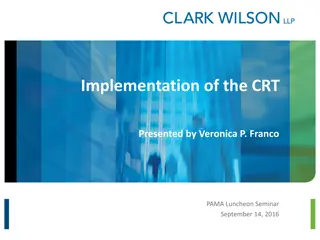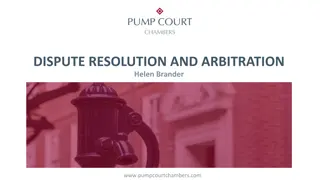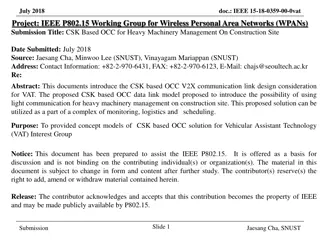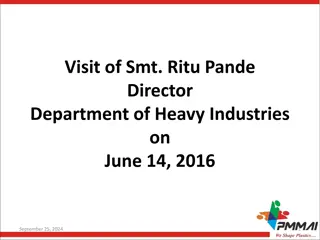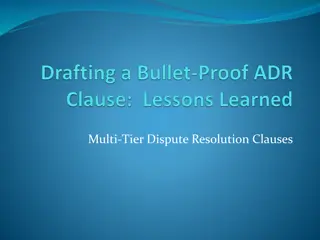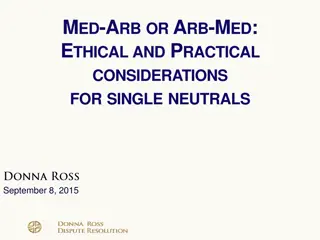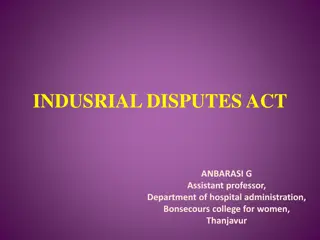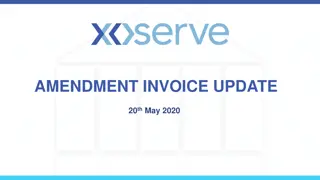Authorities and Machinery for Industrial Dispute Resolution Under the Industrial Dispute Act, 1947
The Industrial Dispute Act, 1947 provides various authorities and machinery for settling industrial disputes, including conciliation, adjudication, and arbitration. Key bodies such as Works Committee, Conciliation Officer, Board of Conciliation, and more play crucial roles in promoting peaceful solutions. Works Committees aim to foster good relations between employers and employees, while Conciliation Officers and Boards work towards mediating and resolving conflicts effectively.
Download Presentation

Please find below an Image/Link to download the presentation.
The content on the website is provided AS IS for your information and personal use only. It may not be sold, licensed, or shared on other websites without obtaining consent from the author.If you encounter any issues during the download, it is possible that the publisher has removed the file from their server.
You are allowed to download the files provided on this website for personal or commercial use, subject to the condition that they are used lawfully. All files are the property of their respective owners.
The content on the website is provided AS IS for your information and personal use only. It may not be sold, licensed, or shared on other websites without obtaining consent from the author.
E N D
Presentation Transcript
AUTHORITIES Under Industrial Dispute Act, 1947 Labour Law-l ,Unit-ll, LL.B. Three years course Presented by Dr Dharmendra Kumar Assistant Professor Shia PG College (Dept. of Law), Lucknow
Various Modes for Industrial peace Settlement of industrial disputes The various modes of settlement of disputes provided by the act may broadly be classified under three heads :- 1. Conciliation / 2. Adjudication 3. Arbitration
Effective machinery for industrial peace Authorities ( ) These Authorities are : - 1. Works Committee ( Sec 3) 2. Conciliation officer (Sec 4) 3. Board of Conciliation (Sec 5) 4. Court of Inquiry (Sec 6) 5. Labour Courts (Sec 7) 6. Industrial Tribunal (Sec 7- A) 7. National Tribunal (Sec- 7- B)
Conciliation machinery The authorities that make use of concellation as a method of settlement of industrial disputes are :- 1. Works Committee ( Sec 3) 2. Conciliation officer (Sec 4) 3. Board of Conciliation (Sec 5) 4. Court of Inquiry (Sec 6)
Adjudication machinery Section 7 to 9 pertain to the constitution of Adjudication Authorities under the Act. These Authorities are:- 1. Labour Courts (Sec 7) 2. Industrial Tribunal (Sec 7- A) 3. National Tribunal (Sec- 7- B) Arbitration : - Section 10 makes provisions for voluntary reference of disputes to Arbitration .
Works committees (Section 3) Composition : appropriate government By order consists of representative of employers and workmen in equal number . The representative of workmen chosen in prescribed manner with consultation of their Trade Union. Industrial establishment hundred work man employed on any day in 12 months Powers and Duties : 1. To promote measures for securing and preserving Amity and good relations between the employers and workmen 2. Common interest or concern of employers and workmen 3. Endeavour to compose any material difference of opinion in respect of such matters.
Conciliation officer (Section 4), The appropriate government may appoint one or more conciliation officers For specified area or for specified industry, one or more. Duty of mediating and promoting the settlement of industrial disputes, Board of conciliation (Sec.5) The appropriate government may appoint by notification board of conciliation with a Chairman and two or four Members The Board to bring the two parties to sit together and trace out the differences , to find out the means to settle them. The chairman shall be an independent person
Court of Inquiry , Sec.6 If occasion arises the appropriate government may constitute a court of inquiry. The inquiry report shall be produced to the government within 6 month The court may consist of one independent person or such number of independent person, if more than one, the one is Chairman. This idea of court is borrowed from England During the pendency of the proceeding before a court of inquiry the following rights remain unaffected, :- 1 ) Right to strike 2) Right to Lock out 3) Right to dismiss or otherwise to punish the workman under section 33
Labour court (section 7), The appropriate government may constitute one or more Labour Courts with the name of person notified in official gazette. The functions of the Labour Courts are :- 1) Adjudication of industrial dispute relating to matters specified in second schedule 2) Performing such other function assigned under this act. Qualifications :- 1) He is, or has been, a Judge of High court 2) District judge or additional district judge for a period of not less than 3 years 3) Judicial Officer in India for not less than seven years 4) Presiding officer of labour courts for not less than 5 years 5) Deputy chief Labour commissioner (Central) or Joint commissioner of state Labour department, degree in Law, at least 7 year experience
Tribunals (Section 7A) Composition Appropriate government may constitute the industrial tribunal Tribunal shall consist of one person only Qualification he is ,or has been, a judge of high court District judge or additional district judge- for a period of not less than 3 years The appropriate government , if it thinks fit, may appoint two persons as Assessors Jurisdiction ll schedule and lll schedule .
Nationaltribunals() Section 7-B Composition- Only by Central Government. One or more. In the opinion of Central Government; (1) Involves question of national importance. (2) industrial establishment situated in one or more States. On this point the Central Government to decide that industrial dispute involve. Judge of High court may appoint the P O of National tribunal . Appoint two assessors .
Procedure, Powers and Duties of Authorities, sec.11-21 Subject to any rules that may be made in this behalf an arbitrator , board court ,labour court ,tribunal or National tribunal shall follow such procedure as may think fit, sec 11 (1) Notice to the enterprises 11(2) Powers of Civil Court ,Sec 11(3) Conciliation officer shall have the power of Civil Court. sec 11(4) Labour court and tribunals , may appoint one or more Assessors ,sec 11 (5) Cost , Sec 11 (7) Execution U/o 21 CPC , Sec 11 (9)
Powers of Labour courts, Tribunals and National Tribunals (section) 11-A If any industrial dispute referred to labour court, tribunal and national tribunal for adjudication, the authorities, as the case may be, is satisfied that the order of discharge or dismissal was not justified, it may :- Power to set aside the award of dismissal or discharge . Power to direct reinstatement of the workmen on such terms and conditions. Power to give such other relief to the workmen including the award of the lesser punishment in lieu of discharge or dismissal as the circumstances of the case may be require. Case , Vs (1983) 3 86 SC - Devendra Swamy vs Karnataka State Road transport corporation,( )I LLJ 454 SC
Duties of Authorities, Sec 12 to 15 Duties of Conciliation officer ,sec 12 Two kind :- 1 Discretionary 2 Mandatory in public utility Duties of boards (section 13) matter referred without delay send a report to appropriate government with memorandum of settlement signed by both parties within 2 months. Duties of court of enquiry section 14 ( ) to enquire matter referred by appropriate government ( )to make report to AP ( ) within the period of six months. Duties of Labour courts Tribunals and National Tribunals Section 15:- They heard the matter referred by appropriate government in accordance with principle of natural justice specified in schedule second and third ,the duties of these bodies are as two fold 1 To hold adjudication proceedings expeditiously , 2 To submit its award to the appropriate government within the period specified.
Reference of Disputes to Boards, Courts or Tribunals (Sec.10) , A pre condition for making any reference by the appropriate government under this section is existence or Apprehension of industrial dispute, it may at any time :- a) Refer the dispute to a board for promoting a settlement thereof, b) Refer any matter Appearing to be connected with or relevant to ,the dispute to a court for enquiry, c) Refer to the labour court for adjudication matter specified in schedule II, d) Refer to the tribunal for adjudication matters specified in schedule II and III U/S 10 (1A) the central government may refer a dispute to the national tribunal for adjudication if it is of the opinion that:- Cont .
To be continued (I) Any dispute exist or apprehended, (II) Any dispute involves any question of national importance, (III) The dispute related to more than one state. Section 10(2) Compulsory Reference by A G :- two conditions (I) An application in the prescribed manner by the parties made jointly or separately. (II) Satisfaction of A G as to the fact that the persons applying represent the majority of each party , if two conditions are fulfilled the matter of industrial dispute may be referred to board, court, tribunals or national tribunal. The award should be provided in a specific time. If industrial dispute connected with individual workman within 3 months.
References , (): - Labour and Industrial law- S .N Mishra, 26th edition, Central law publications Elements of Industrial Law N. D. Kapoor s , SCS Sultan Chand educational publishers. Labour and industrial laws Dr V.G. Goswami, Central Law Agency. ,
